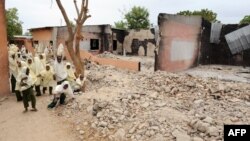ABUJA —
Amnesty International says "education is under attack'" in northern Nigeria with as many as 70 teachers and more than 100 students killed since the beginning of 2012.
In the past, when schools were attacked in northern Nigeria, they were attacked at night, burnt to the ground while students and teachers were in their homes.
But nowadays, when insurgents attack schools, they often do it in broad daylight, slaughtering teachers and students before destroying buildings, says Amnesty International’s Makmid Kamara.
“It has become more brutal because teachers are being specifically targeted and students -- school children and students - are also being targeted and killed,” said Kamara.
School attacks are usually blamed on Boko Haram, a militant group that is believed to be responsible for thousands of deaths since it began violent operations in 2009. The group said it wanted to establish an Islamic state in Nigeria and called itself “The People Committed to the Propagation of the Prophet’s Teachings and Jihad” in Arabic.
However, they are better known by the nickname, Boko Haram, which means “Western education is a sin.”
In May, the Nigerian government declared a state of emergency in much of northeastern Nigeria and sent thousands of troops to fight Boko Haram. And while the military regularly reported success in battle, attacks on schools continued and Amnesty said the government was not doing enough to stop it.
“The Nigerian government has a duty and a responsibility to prevent these attacks by taking lawful and effective measures and we think those who are responsible should be held to account,” said Kamara.
Kamara said suspected Boko Haram members were also known to intimidate teachers by standing outside of classrooms heavily armed.
Last Sunday, more than 40 students were killed by gunmen in their dormitory in Yobe state, not far from a secondary school where nearly 30 students were killed in July.
Some parents said they were terrified to send their children to school. Abdullahi Bego, the spokesperson for Yobe State Governor Ibrahim Gaidam, said the military should increase security around schools, to ensure children can be educated.
"So there is a concern across the board, shared by the government and by the people of the state, but that does mean that parents are not going to allow students to go to school? Because if we do that, it means we are giving in to these criminals and terrorists who want to stop our children from getting an education," he said.
In parts of northern Nigeria, Amnesty said, as many as 80 percent of the students have stopped attending classes and more than a thousand teachers have fled the region. Students, they said, now hide their books and uniforms, while parents were warned by gunmen to only send their children to Islamic schools.
In the past, when schools were attacked in northern Nigeria, they were attacked at night, burnt to the ground while students and teachers were in their homes.
But nowadays, when insurgents attack schools, they often do it in broad daylight, slaughtering teachers and students before destroying buildings, says Amnesty International’s Makmid Kamara.
“It has become more brutal because teachers are being specifically targeted and students -- school children and students - are also being targeted and killed,” said Kamara.
School attacks are usually blamed on Boko Haram, a militant group that is believed to be responsible for thousands of deaths since it began violent operations in 2009. The group said it wanted to establish an Islamic state in Nigeria and called itself “The People Committed to the Propagation of the Prophet’s Teachings and Jihad” in Arabic.
However, they are better known by the nickname, Boko Haram, which means “Western education is a sin.”
In May, the Nigerian government declared a state of emergency in much of northeastern Nigeria and sent thousands of troops to fight Boko Haram. And while the military regularly reported success in battle, attacks on schools continued and Amnesty said the government was not doing enough to stop it.
“The Nigerian government has a duty and a responsibility to prevent these attacks by taking lawful and effective measures and we think those who are responsible should be held to account,” said Kamara.
Kamara said suspected Boko Haram members were also known to intimidate teachers by standing outside of classrooms heavily armed.
Last Sunday, more than 40 students were killed by gunmen in their dormitory in Yobe state, not far from a secondary school where nearly 30 students were killed in July.
Some parents said they were terrified to send their children to school. Abdullahi Bego, the spokesperson for Yobe State Governor Ibrahim Gaidam, said the military should increase security around schools, to ensure children can be educated.
"So there is a concern across the board, shared by the government and by the people of the state, but that does mean that parents are not going to allow students to go to school? Because if we do that, it means we are giving in to these criminals and terrorists who want to stop our children from getting an education," he said.
In parts of northern Nigeria, Amnesty said, as many as 80 percent of the students have stopped attending classes and more than a thousand teachers have fled the region. Students, they said, now hide their books and uniforms, while parents were warned by gunmen to only send their children to Islamic schools.




